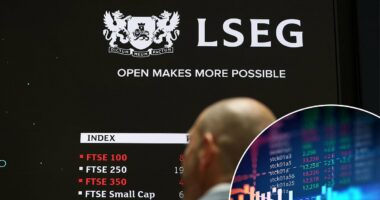Share this @internewscast.com
In the ever-evolving landscape of digital technology, a new controversy has emerged that has the potential to reshape the dynamics of social media ownership and usage. The center of this controversy is the popular video-sharing app TikTok, owned by the Chinese company ByteDance. The app, which has gained immense popularity worldwide, is now facing a potential ban in the United States unless sold to U.S. owners. This move, initiated by U.S. politicians, has sparked a heated debate about data privacy, political misinformation, and the power dynamics between the U.S. and China in the digital world.
The key figure in this drama is Steve Mnuchin, the former Treasury Secretary under the Trump administration. Mnuchin and a group of his affluent political associates have expressed interest in purchasing TikTok’s U.S. operations. The proposed price tag? A few billion dollars. This might seem like a hefty sum, but when compared to the value of other social media giants, it’s a bargain. For instance, Meta, the parent company of Instagram, is valued at $1.25 trillion.
Why the ban?
The popularity of TikTok is undeniable. Its usage is nearly double that of Instagram, making it a highly lucrative platform. Why would U.S. politicians want to ban such a profitable app unless it’s sold to U.S. owners? The answer lies in two primary concerns: data privacy and the spread of political misinformation.
The first concern concerns the fear of China accessing U.S. users’ data. This apprehension is not unfounded, given the increasing importance of data in today’s digital age. However, it’s worth noting that U.S. politicians have assured the public that all U.S. TikTok data is stored on servers in Texas without Chinese access. This raises questions about the validity of the data privacy argument and whether it’s being used as a smokescreen for other motives.
Political misinformation and tit-for-tat
The second concern is about the potential spread of political misinformation through TikTok. This is a valid concern, considering the role social media platforms have played in recent years in shaping public opinion and influencing political outcomes. However, it’s worth questioning whether the information on TikTok significantly differs from that on other social media platforms.
The move to ban TikTok unless it’s sold to U.S. owners can also be seen as a tit-for-tat response to China’s ban on using U.S. social media in China. However, the proposed ban on TikTok is not an outright ban. Instead, it’s a strategic move to redirect the profits from TikTok to U.S. owners, specifically to Steve Mnuchin and his associates.
Unraveling the motives
This situation raises several questions about the motives behind this move. Is it a legitimate concern for national security and the prevention of misinformation, or is it a power play to control a highly profitable social media platform? Is it an attempt to level the playing field with China, or is it a strategic move to benefit a select group of individuals?
The TikTok controversy is a complex issue that goes beyond social media. It reflects the power dynamics in the digital age, where data is the new currency and control over popular platforms can translate into significant political and economic power. As this situation unfolds, it’s crucial to critically examine the motives behind such moves and their implications for the future of digital technology and global power dynamics.
Conclusion
In conclusion, the TikTok controversy is a testament to the intricate interplay between technology, politics, and power. It’s a reminder that in the digital age, the battle for control is fought on the physical battlefield and in the virtual world of social media. Whether this move is seen as a legitimate concern or the ultimate gangster move, it’s clear that the stakes are high, and the outcome will have far-reaching implications.
Frequently Asked Questions
Q. What is the controversy surrounding TikTok?
The controversy revolves around the potential ban of the popular video-sharing app, TikTok in the United States unless it is sold to U.S. owners. This move has sparked a heated debate about data privacy, political misinformation, and the power dynamics between the U.S. and China in the digital world.
Q. Who is the key figure in this unfolding drama?
The key figure in this drama is Steve Mnuchin, the former Treasury Secretary under the Trump administration. Mnuchin and a group of his affluent political associates have expressed interest in purchasing TikTok’s U.S. operations.
Q. Why is there a potential ban on TikTok?
The potential ban on TikTok arises from two primary concerns: data privacy and the spread of political misinformation. There is a fear of China accessing U.S. users’ data and the potential spread of political misinformation through TikTok.
Q. What is the role of political misinformation in this controversy?
The concern about the potential spread of political misinformation through TikTok is significant, considering the role social media platforms have played in recent years in shaping public opinion and influencing political outcomes.
Q. What are the motives behind the move to ban TikTok?
The motives behind this move are complex and could range from a legitimate concern for national security and the prevention of misinformation to a power play to control a highly profitable social media platform or a strategic move to benefit a select group of individuals.
Q. What are the implications of the TikTok controversy?
The TikTok controversy reflects the power dynamics in the digital age, where data is the new currency and control over popular platforms can translate into significant political and economic power. The outcome of this situation will have far-reaching implications for the future of digital technology and global power dynamics.
The post Decoding the TikTok ownership controversy appeared first on Due.










